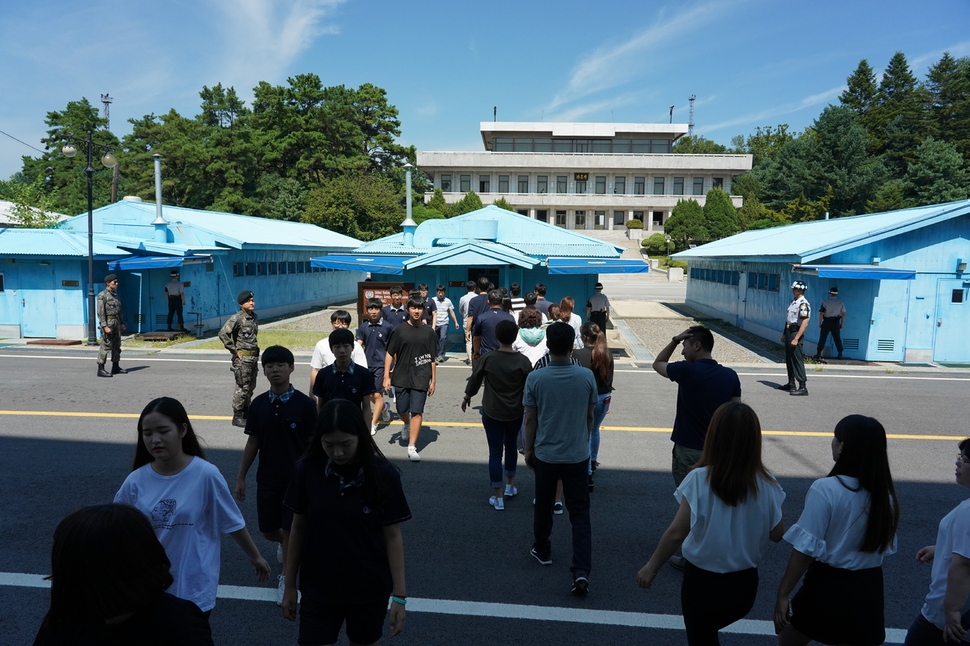 |
|
On Aug. 22, people visit the site where the United Nations Command Military Armistice Commission oversaw the armistice agreement for the Korean War at Panmunjom. (all photos by Park Kyung-man, North Geonggi correspondent)
|
Area receives thousands of visitors after historic inter-Korean summit
During their summit at Panmunjom on Apr. 27, the leaders of South and North Korea strolled hand in hand and spoke of peace. But in the same area, the North Korean government continues to be called a “puppet regime.” Along the border, the two countries are still “enemies,” rather than “partners.” On Aug. 22, a Hankyoreh reporter joined 15 members of multicultural families on a stop at a visitors’ center run by the guard unit at the Joint Security Area (JSA) in Panmunjom. The visitors’ center, located about 4km away from Panmunjom, is an essential stop on any trip to the JSA. It’s here that visitors are given a security briefing and put aboard dedicated vehicles that will take them to Panmunjom (also called Neolmunli). Before stepping inside the visitors’ center, I’d had some hopes that spring had arrived, given the Panmunjom Declaration reached by the two leaders on Apr. 27, but I found that winter still reigned inside the building. The video briefing in the visitors’ center still referred to North Korea as the “puppet regime.” This was the term used to disparage North Korea during the Cold War by implying that the North Korean leaders were mere puppets with other powers pulling the strings. The video showed scenes from a lethal ambush of a truck in 1968 and the “Axe Murder Incident” in 1976, while the narrator explained that the “North Korean puppet regime” had carried out more than 3,000 armed provocations since the peninsula was divided. The JSA unit was also described as the “world’s only fighting unit combining South Korean and American troops” which is “just one meter away from the enemy.” The phrase “they’re face to face with the enemy once again today” was a tacit reminder that North Korean troops are “the enemy.” While Seoul has decided to delete the phrase “the North Korean government and the North Korean People’s Army are our enemy” from the Defense Ministry White Paper that will be published at the end of this year, the phrase still survives at the visitors’ center. Despite this atmosphere, visitors calmly voiced their hope for peace on the Korean Peninsula, including Park Seong-hui, 36, a naturalized Korean citizen from the Philippines who had brought her son, an elementary school student, on the trip. “I’ve heard that the peninsula was divided by war. I really hope that South and North Korea will be reunited through mutual respect,” Park said. Heo Ho-jeong, a 14-year-old boy in his second year at Yeongbuk Middle School, also offered his thoughts: “This really brings the division home to me. I wish South and North Korea would work together on development instead of fighting with each other.” “I’m hopeful about the mood for peace that has formed recently on the Korean Peninsula,” said a 50-year-old Chinese-American named Wang who met the Hankyoreh at the Third Tunnel, one of a number of tunnels that the North Koreans dug beneath the DMZ. “The world needs to be proactive about helping North Korea with its difficult circumstances, and North Korea needs to make an effort, too,” Wang said. “Around the DMZ, the focus is still on anti-communist and security training that arouses hostility toward North Korea. The training programs need to be reoriented now toward the perspective of peace,” said Noh Hyeon-gi, co-president of the Paju Environmental Campaign Alliance, which has organized lectures about peace and ecology around the DMZ over the past eight years. But on Thursday, the “winds of peace” that have been blowing recently were tangible at DMZ sites in Paju, including Panmunjom and the Third Tunnel: even though it was a weekday, parking lots were crammed with buses wherever we went. Whereas 480,000 people visited the DMZ last year, there have already been 340,000 visitors so far this year, including 125,000 from other countries. By Park Kyung-man, North Geonggi correspondent Please direct comments or questions to [english@hani.co.kr]






